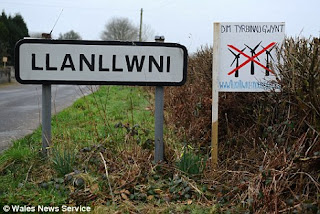Wind
farms can wipe tens of thousands of pounds off the value of homes, a government
agency has admitted for the first time.
The
Valuation Office Agency has been forced to re-band homes into lower council tax
categories, confirming what most residents who live near the giant turbines
already know: they are detrimental to property prices. The
move will make it harder for the wind farm industry to dismiss public concerns
over the impact of their turbines.
At
least five homeowners have seen their properties officially downgraded by the
VOA because of their proximity to windfarms. But
only cases that go to appeal are made public by the agency, suggesting many
more applications have been received for council tax discounts.
In
one case, a couple saw the value of their home near the Fullabrook wind farm
site near Braunton, Devon, fall from £400,000 to £300,000 when they asked
estate agents to value it. The
home is 650 yards from three of the turbines and the couple feared that the
noise and visual dominance of the turbines would not only de-value their home,
but make it impossible to sell.
The
VOA agreed to put the home from council tax F to band E, saving the couple £400
a year in council tax. Families
living in the seaside Suffolk village of Kessingland have also applied to be
put into a lower council tax band as many of their homes are near 400ft
turbines.
When
one resident, Sue Price, put her home up for sale last year for £460,000, she
found a buyer. But they pulled out when local papers reported that the wind
farms were about to be erected and estate agents told her to drop her price,
she told the Sunday Times.
‘We
went down to £360,000 and still could not sell so now we have taken it off the
market,’ she said.
Waveney
Council which covers the area has admitted that the constant swooshing noise
does constitute a ‘statutory nuisance’, and is working on a technical solution
with the wind farm operators, Triodos Renewables.
Recent
council-tax rebandings by the Valulation Office are the first admission by an
arms-length government body that house prices can be dented by wind farms. This
is despite other studies pointing to their detrimental effects, including the
Royal Institute of Chartered Surveyors who pointed out in a 2007 report that
homes within one mile of wind farms would lose value.
One
in five prospective buyers rate peace and quiet as their number one priority
when looking at a house, according to an Alliance and Leicester survey.Val
Weedon, the honorary president of the UK Noise Association, said wind farms
would have an impact on people’s quality of life and therefore house prices.
She
said: ‘These re-valuations will set a precedent which the wind farm industry
does not want. Wind farm noise is like road and airport noise, it has an impact
on property prices.’‘Noise
is also associated with headaches and nausea as it is a form of stress, so it
can also have a detrimental effect on your health.’
It
was revealed last week that every home in Britain will pay £88 to build a vast
network of pylons in a £22billion project to link wind farms to the national
grid.Bills
will start to rise next year under the controversial plans revealed by industry
regulator Ofgem.
An
average of £11 will be added annually for eight years, making £88 in total on
top of any other increases. The
industry was recently dealt a blow by Chancellor George Osborne, who demanded
huge cuts in government aid for wind farms. The
Chancellor told the Treasury to draw up plans for a reduction of 25 per cent in
subsidies for onshore wind farms.
A
VOA spokesman said: ‘The Valuation Office Agency (VOA) is responsible for
keeping council tax bands up to date in England and Wales. We do not record the
number of occasions where a band challenge is made by a taxpayer due to the
proximity of a wind turbine/farm.
‘If
a taxpayer believes that the value of their home has been reduced by a
substantial physical change to their locality, then they may be entitled to
make a proposal to alter their band.'The
proposal will be considered by the VOA, which may or may not result in a band
change. If the taxpayer disagrees with the decision of the VOA, there is a
right of appeal to an independent Valuation Tribunal.’


No comments:
Post a Comment